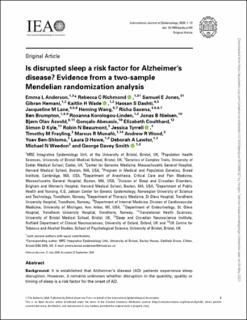Is disrupted sleep a risk factor for Alzheimer's disease? Evidence from a two-sample Mendelian randomization analysis
Anderson, Emma L.; Richmond, Rebecca C.; Jones, Samuel E.; Hemani, Gibran; Wade, Kaitlin H; Dashti, Hassan S.; Lane, Jaqueline; Wang, Heming; Saxena, Richa; Brumpton, Ben Michael; Korologou-Linden, Roxanna; Nielsen, Jonas Bille; Åsvold, Bjørn Olav; Abecasis, Goncalo; Coulthard, Elizabeth; Kyle, Simon D.; Beaumont, Robin N.; Tyrell, Jessica; Frayling, Timothy M; Munafo, Marcus R; Wood, Andrew R; Ben-Shlomo, Yoav; Howe, Laura D; Lawlor, Deborah A.; Weedon, Michael N; Smith, George Davey
Peer reviewed, Journal article
Published version

View/
Date
2020Metadata
Show full item recordCollections
- Institutt for samfunnsmedisin og sykepleie [3707]
- Publikasjoner fra CRIStin - NTNU [38576]
- St. Olavs hospital [2580]
Abstract
Background
It is established that Alzheimer’s disease (AD) patients experience sleep disruption. However, it remains unknown whether disruption in the quantity, quality or timing of sleep is a risk factor for the onset of AD.
Methods
We used the largest published genome-wide association studies of self-reported and accelerometer-measured sleep traits (chronotype, duration, fragmentation, insomnia, daytime napping and daytime sleepiness), and AD. Mendelian randomization (MR) was used to estimate the causal effect of self-reported and accelerometer-measured sleep parameters on AD risk.
Results
Overall, there was little evidence to support a causal effect of sleep traits on AD risk. There was some suggestive evidence that self-reported daytime napping was associated with lower AD risk [odds ratio (OR): 0.70, 95% confidence interval (CI): 0.50–0.99). Some other sleep traits (accelerometer-measured ‘eveningness’ and sleep duration, and self-reported daytime sleepiness) had ORs of a similar magnitude to daytime napping, but were less precisely estimated.
Conclusions
Overall, we found very limited evidence to support a causal effect of sleep traits on AD risk. Our findings provide tentative evidence that daytime napping may reduce AD risk. Given that this is the first MR study of multiple self-report and objective sleep traits on AD risk, findings should be replicated using independent samples when such data become available.
